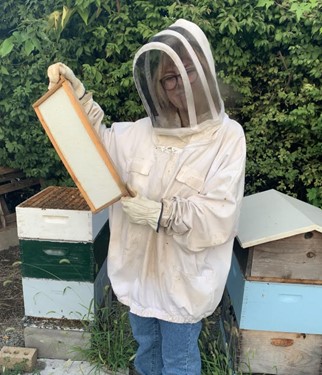Campus Gardens
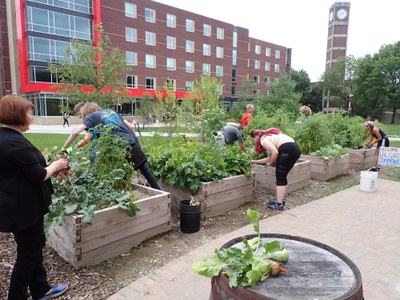
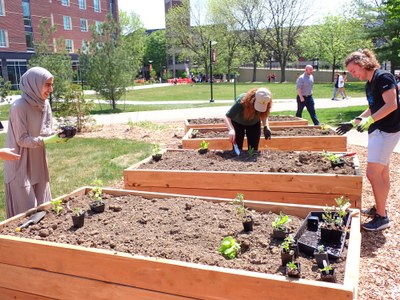
2023-24 Garden Interns: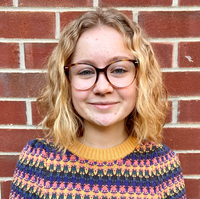
Savannah Dowell (270-315-7884)
&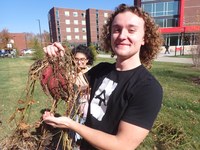
Jacob Brown (606-375-5565)
UofL Garden Commons: Eating healthier and being self-sustainable on campus (The Louisville Cardinal, 3/8/19)
Garden Commons
Interested in health, sustainability, good food, and growing things?! We need your help to make our garden grow! The Garden Commons is a community space for learning about organic urban agriculture, more sustainable food systems, and building resilient community. The Garden Commons is open to participation throughout the year from students, staff, faculty, and community members. Everyone who helps out is welcome to share in the harvest! In 2023, the Garden Commons relocated northeast of the Baptist Center, just west of Belknap Village North, and within sight of the SAC Clocktower.
Don't miss upcoming events - sign-up here to stay informed and follow our Facebook Page or 
What's in the Garden? Check out our 2024 Garden Maps.
Spring 2024 Garden Gatherings
Tuesdays, 4pm at the Garden Commons (northeast of the Baptist Center)
Fridays, 1pm at the Urban & Public Affairs Garden (426 W. Bloom St., behind Bettie Johnson Hall)
UofL’s organic campus gardens are great places to relax, reconnect, learn, and savor the sweet taste of sustainability! Students, faculty, staff, and the public are all welcome to come experience the thrill of turning tiny seeds into an abundance of hyper-local veggies, herbs, fruit & flowers. Stop by anytime to sample the goodness and help us keep things watered and weeded. We will gather weekly at both of our campus food gardens throughout the spring semester (Jan. 16 - April 30) to harvest, weed, water & plant. Monthly hands-on Garden Workshops will also be offered at these times. Tools and gloves provided, but bring bags to harvest into! Everyone who comes is welcome to share in the harvest! Connect with us and get all the details on Facebook or Instagram.
Spring 2024 Garden Workshops:
Friday, Feb. 2 - Maple Tapping (1pm, meetup at Garden Commons)
Friday, Feb. 16 - Winter Orchard Care (1pm, Urban & Public Affairs Garden)
Friday, March 1 - Seed-Starting (video. photos.) (1pm, Urban & Public Affairs Greenhouse)
Friday, March 22 - Weather and Gardening Workshop (2:30pm, Garden Commons)
Tuesday, April 9 - Guerilla Gardening (4pm, Garden Commons)
Tuesday, May 28 - Serviceberry Foraging (Noon, meetup at Garden Commons)
- Inquiries about the Garden Commons can be directed to our Garden Interns: Savannah Dowell (270-315-7884) and Jacob Brown (606-375-5565).
- The Garden Commons is a community space open throughout the year to participation from all students, staff, faculty, and community members. Those who help out in the garden are welcome to enjoy the fruits of our labor via you-pick. Please don't horde the harvest.
- You need not wait for an invitation to get involved, but please join us as we gather weekly throughout the year for group workdays and a series of practical, hands-on workshops about how to manage different aspects of a chemical-free garden and other urban agriculture and sustainable food system topics. Learn more and get involved by signing-up here to stay informed and joining us on Facebook or


UofL's Renewable Energy & Energy Efficiency Club built & installed solar panels to power the greenhouse ventilation in May 2012!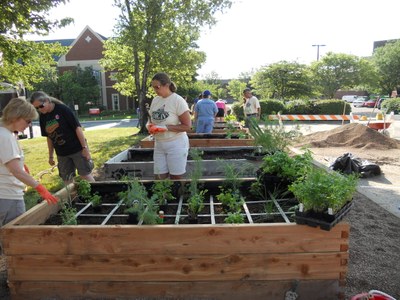
Garden Commons Grows (UofL News, June 27, 2011)
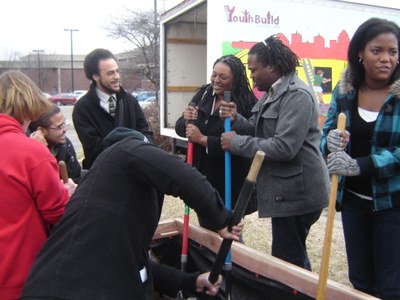
March 3, 2010 - UofL breaks ground on the Garden Commons in partnership with YouthBuild and Louisville Grows.
- In 2020, the Garden Commons moved from its original home next to the Cultural Center due to the construction of a new residence hall (Belknap Village North) on the site. The location from 2020-22 was adjacent to the Biology Department's Harriet A. Korfhage Native Plant Garden, at the southwest corner of Strickler Hall. In 2023, we were forced to relocate again due to Speed Art Museum construction, to our new home just north of the Baptist Center, west of Belknap Villages North and within sight of the SAC Clocktower.
- Several sustainable urban farming. permaculture, and sustainability practices are in use at the Garden Commons, including:
1. Rainwater capture from the roof for irrigation in a 500-gallon rain barrel system;
2. Composting to generate organic fertilizer in two large bins where you can toss your food scraps, soiled paper products, and other organics (no meat, bones, or dairy products, please);
3. Ten raised beds and several in-ground beds;
4. Perennial herbs, asparagus, and berries (strawberry, raspberry, blackberry); and
5. An orchard including two Santa Rosa plum trees, one amazing apple tree that has been grafted with SIX different kinds of apples (Fuji, Gala, McIntosh, Braeburn, Gravenstein, & Jonagold), and several native species including: a serviceberry, a persimmon, three pawpaws, and a maple tree that we tap each winter to make maple syrup.
6. An outdoor classroom space with bike racks, solar lights and a solar charging umbrella where people can sit in the shade and recharge their devices with the sun!
7. Sharing Stations: donation bins for the UofL Free Store, a Little Free Library (installed with the partnership of UofL's Resilient Families Project), and a Pineal Trade Station for the free exchange of excess produce and plants (houseplants, cuttings, native plants, etc.) - The Garden Commons hosts an on-going series of hands-on workshops about organic gardening, agriculture, permaculture, and food justice.
- Historical Notes:
- In March 2010, we broke ground on the original Garden Commons site next to the former Cultural Center to install our first four raised beds as a collaborative project in partnership with the new non-profit, Louisville Grows (this was their very first project!). The Garden has grown in scope and scale considerably since then. The first big change came during a summer 2011 expansion project with funding and volunteer labor donated by the Akzo Nobel coatings company.
- At the original Cultural Center location, the Garden Commons also featured: a polycultural permaculture bed called a hugelkulture mound (buried wood which slowly composts, reducing the need for irrigation and fertilizer); a mini orchard planted in Spring 2013, with a dwarf apple (relocated to the Urban & Public Affairs garden) and peach tree (relocated west of Brigman Hall); a large, season-extending greenhouse with solar panels to power the ventilation fans and aquaponics pump (relocated to the Urban & Public Affairs garden); Maple trees, whose sap was tapped in January/February to make syrup; and bike parking. We also experimented with an aquaponics system in the greenhouse to raise fish and use their waste as fertilizer for plants grown in the system. In 2020, the components of that system were relocated to UofL's Community Composting Project site; and then in 2023, they were relocated to the greenhouse at the Urban & Public Affairs Garden.
- In 2011, students self-organized to form a Garden Commons RSO (Recognized Student Organization) whose goal was: "Educating ourselves to become urban farmers." The RSO is currently dormant, but could be revived with new student leadership. When the RSO was active, students met regularly to take the lead role in making decisions about what to plant, how to care for the crops, and what to do with the harvest - though everyone in the UofL community was invited to participate.
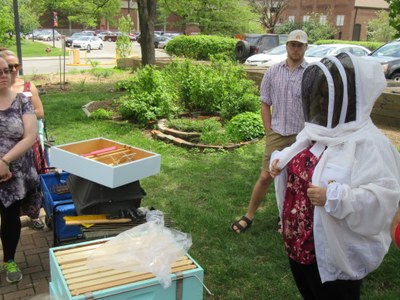 Garden Commons teaches students how to garden early (The Louisville Cardinal, 2/26/20)
Garden Commons teaches students how to garden early (The Louisville Cardinal, 2/26/20)
Wreath-making workshop gets campus into the holiday spirit (UofL News, 12/3/18) Photos. UofL hosts beekeeping workshop as part of Earth Week (WDRB, 4/17/17) Photos. Video.
UofL holds workshop on native plants (Fox19, 3/15/17)
Five things we learned about syrup during on-campus workshop (UofL News, 2/17/17)
Students get a taste for sustainable gardening (UofL News 9/4/15)
2012 Garden Workshop Series
Video: Garden Commons Expansion: June 2011
Garden Commons Grows (UofL Today, June 27, 2011)
Video: Garden Commons grows Nov. 2010
Video: Garden Commons Ground-breaking, March 3, 2010
Garden Workshops
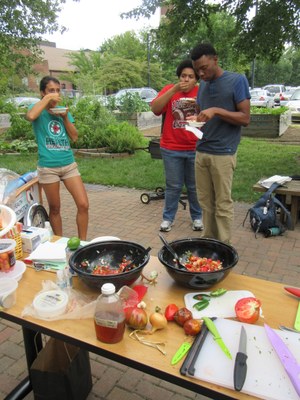
Students get a taste for sustainable gardening Homegrown: UofL Magazine highlights local alums who are rooting out food insecurity (Dec. 16, 2021)
Homegrown: UofL Magazine highlights local alums who are rooting out food insecurity (Dec. 16, 2021)
Maple Tapping Workshop
Rain Barrel Workshop
Beekeeping & Pollinators Workshop
Aquaponics Workshop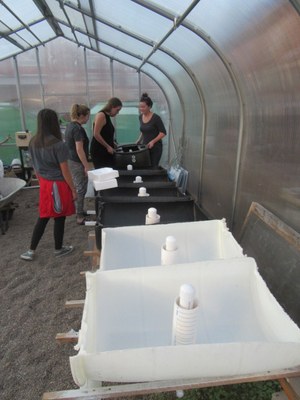
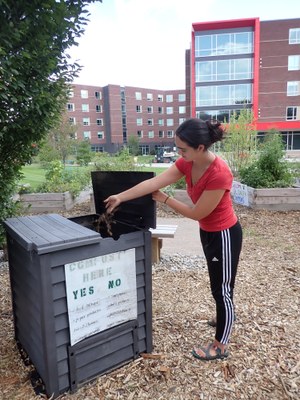
The Garden Commons hosts to an on-going series of workshops each fall and spring. Workshops are open to all, typically involve some hands-on experience, and have focused on everything from organic gardening practices (composting, rainwater harvesting, soil management, cover crops, natural pest repellents, seed saving, seed starting, compost tea, permaculture, intercropping, etc.) to harvest preserving techniques and cooking/nutrition to larger issues such as food justice and sustainable food systems. UofL's Sustainability Council has taken the lead to organize workshops, in collaboration with off-campus partners like the Urban Agriculture Coalition and on-campus partners like the Office of Health Promotion and the UofL Eco-Reps Program.
-
FALL 2023 Workshop Series:
Aug. 19 - Garden Commons Salsa Party (video.)
Aug. 31 - Newton's Apple Crisp & Pawpaw Ice-Cream! (photos.)
Sept. 28 - Fall Planting (video.)
Oct. 12 - Think Like a Squirrel - Urban Nut Foraging
Oct. 16 - Cover Crops Workshop
Oct. 19 - Food Justice (video.)
Oct. 23 - CommuniTEA: Gender Inequality & Climate Change
Nov. 30 - Wreath-Making
-
SPRING 2023 Workshop Series:
Jan. 19, 12:30pm, Maple-Tapping (photos & videos.)
Feb. 4, 12-6pm, Kentucky Maple Day: Sugar Shack Open House (Making Maple Syrup with UofL Sap)
Feb. 17, 2-5pm, Winter Orchard Care (photos.)
Mar. 2, 12:30pm, Seed-Starting (video. photos.)
Apr. 13, 5pm, Beekeeping & Pollinators (photos.)
May 25, 12:30pm, Serviceberry Foraging (photos.)
-
FALL 2022 Workshop Series:
Aug. 20, 1:30pm - Salsa Harvest Party
Sept. 16, 1pm - Herbs & Tea (video)
Oct. 14, 1pm - Tree-Rings (for Tree Week!) (video. photos.)
Oct. 28, 1pm - Aquaponics (video. photos.)
-
SPRING 2022 Workshop Series:
Jan. 14, 1pm - Maple Tapping
Feb. 11, 1pm - Winter Orchard Care (photos.)
Mar. 4, 1pm - Seed Starting (photos. video 1. video 2.)
Apr. 8, 1pm - Gender and Gardening Workshop (video)
May 27, 1pm - Serviceberry Foraging Party (photos.)
-
FALL 2021 Workshop Series:
Aug. 19 - Salsa Harvest Party (photos. video.)
Sept. 3 - Cool Weather Gardening (photos. video.)
Sept. 24 - Gardening as Resistance
Oct. 15 - Medicinal Plants
Oct. 29, 1pm - Tree Planting (UofL Arbor Day) (photos. video.)
Nov. 19, 11am-2pm - Wreath Making (photos)
-
SPRING 2021 Workshop Series:
Jan. 15, noon - Maple Tapping (video of tapping. video of workshop. photos.)
Mar. 5, noon - Seed Starting (at Urban & Public Affairs greenhouse. video. photos.)
Mar. 12, noon - Beekeeping & Pollinators (video)
Apr. 9, noon - Rain Barrel Making (video. photos.)
June 4, noon - Serviceberry Foraging (photos.)
-
FALL 2020 Workshop Series:
Aug. 12-14, 3pm - Salsa Making / Harvest Party
Aug. 21, noon - Louisville Community Grocery & Food Justice
Sept. 18, noon - Divest UofL & Just Transition (video)
Oct. 23, noon - Arbor Day Celebration & Urban Canopy Project (photos) (video)
Nov. 13, noon - Holiday Wreath-Making (photos) (video) -
SPRING 2020 Workshop Series:
Jan. 17, noon – Maple-Tapping
Feb. 21, noon – Seed Starting. See photos.
March 20, noon – Pollinators & Beekeeping (CANCELED)
April 10, noon – Climate Anxiety (CANCELED)
June 1, noon - Serviceberry Foraging Workshop
-
FALL 2019 Workshop Series:
Aug. 17, 4pm - Salsa Making
Aug. 30, 1pm - Food Justice with New Roots, Inc.
Sept. 6, 12pm - Herbal Tea-Making
Oct. 11, 12pm - Fermentation
Nov. 15, 12pm - Wreath Making -
SPRING 2019 Workshop Series:
Jan. 18, 12pm - Maple Tapping
Feb. 15, 12pm -Seed Starting
Mar. 22, 12pm - Composting
Apr. 12, 12pm - Climate Change Anxiety & Meditation
May 31, 12pm - Serviceberry Foraging
-
FALL 2018 Workshop Series:
Aug. 18, 4pm - Salsa Making
Sept. 7, 12pm - Herbs & Tea-Making
Sept. 21, 12pm - Canning & Fermentation
Oct. 26, 12pm - Sustainability & Cannabis: Navigating an ever growing bureaucracy (joint workshop for UofL Sustainability Week with EcoReps in Ekstrom W210)
Nov. 16, 12pm - Wreath Making
-
SPRING 2018 Workshop Series:
Jan. 19, 1pm - Maple Tapping (sign-up to volunteer to empty buckets) - See Photos. Watch Video.
Feb. 23, 1pm - Seed Starting
Mar. 30, 1pm - Composting
Apr. 20, 1pm - Hydroponics
June 1, 1pm - Serviceberry Harvest - See Photos.
-
FALL 2017 Workshop Series:
Sept. 15, 12-1pm - Herbs & Teas
Sept. 22, 12-1pm - Canning & Pickling
Oct 27, 12-1pm - Native Plants & Pollinators Video.
Dec. 1, 12-1pm - Wreath-Making
Dec. 8, 12-1pm - Garlic Planting -
SPRING 2017 Workshop Series:
Feb. 13, 1-2pm - Maple Tapping Workshop
Mar. 20, 1-2pm - Native Plants. Watch the video recording.Apr. 17, 1-2pm - Pollinator Workshop. Watch the video recording.
-
FALL 2016 Workshop Series:
Sept. 9, 2-3pm - Fall Lettuce Planting
Sept. 23, 2-3pm - Green Apple Day of Service & Workshop with Stephen Bartlett, Sustainable Agriculture of Louisville. Workshop Video.
Oct. 7, 2-3pm - Herb Harvest & Workshop - Sample Teas and Learn to Dry Herbs
Oct. 21, 2-3pm - Garlic Planting Day!
Nov. 7, 3-4pm - Aquaponics
Nov. 21, 3-4pm - Adding Compost & Putting the Garden to Bed
Dec. 5, 3-4pm - Greenhouse Growing - Read more about the 2015-16 Sustainable Gardening Workshop Series: Students get a taste for sustainable gardening (UofL News 9/4/15)
- Read about the 2012 Garden Workshop Series.
Urban & Public Affairs Horticulture Zone
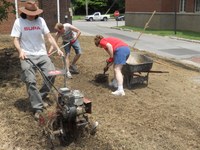 What's in the Garden? Check out our 2024 Garden Maps.
What's in the Garden? Check out our 2024 Garden Maps.
- The UPA Horticulture Zone has been growing food & community behind UofL's Urban Studies Institute (426 W. Bloom St., west of Bettie Johnson Hall) since ground-breaking on May 22nd, 2013!
- It was created as an initiative of the Urban & Public Affairs Student Organization, with funding provided by both the Student Organization and the Department of Urban & Public Affairs.
- The students were inspired to take an under-utilized small lawn behind the building and turn it into a living, productive, and engaging “Horticulture Zone.” What had once been an uninviting patch of grass
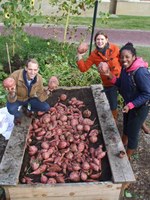 that had to be mowed regularly with fossil fuels was transitioned into an inviting outdoor gathering space beside our historic apple tree.
that had to be mowed regularly with fossil fuels was transitioned into an inviting outdoor gathering space beside our historic apple tree. - The space is used to grow fresh, delicious produce available to the community in our mini orchard (peach, apple, fig, and native serviceberry, pawpaw, hazelnuts, and maypops) and in four raised beds filled with rich, organic compost made by volunteers on campus from food waste collected both on and off campus.
- UPA students worked with Physical Plant’s grounds team to develop a site design that includes four hand-built planter beds with benches, two compost bins, five rain barrels to capture water from the roof for irrigation, native shade-tolerant plants for areas under the canopy, and nitrogen-fixing red clover no-mow areas inspired by the Air Pollution Control District’s “Grow More, Mow Less” campaign which was run at the time by UPA graduate, Eric Burnett.
-
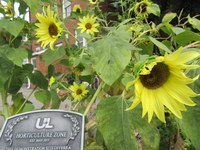 After an abundant first growing season in 2013, the new garden was formally dedicated during on Campus Sustainability Day, October 23, 2013. The dedication ceremony was a highlight of UofL Sustainability Week and included the harvest of over 100 pounds of sweet potatoes grown in just one of the raised beds! Read the story: Campus horticultural zone has flowers, vegetable garden(UofL Today, Oct. 22, 2013)
After an abundant first growing season in 2013, the new garden was formally dedicated during on Campus Sustainability Day, October 23, 2013. The dedication ceremony was a highlight of UofL Sustainability Week and included the harvest of over 100 pounds of sweet potatoes grown in just one of the raised beds! Read the story: Campus horticultural zone has flowers, vegetable garden(UofL Today, Oct. 22, 2013) - With the relocation of the Garden Commons in 2020 to a smaller site, the greenhouse was relocated to the UPA Horticulture Zone. This large, season-extending greenhouse features solar panels to power the ventilation fans.
- The UPA Horticulture Zone is an all-volunteer project open to participation from anyone in the community.
Beekeeping
In 2020-21, with funding from SGA, the UofL Sustainability Council acquired beekeeping equipment and two hives of bees from a neighbor in Schnitzelburg. This allowed us to establish an educational apiary on campus. In its first couple years, the apiary was located at the site of the UofL Community Composting Project. In 2023, the apiary was relocated to a more accessible and safer location that is even better for the bees, at the UPA Horticulture Zone, in the central courtyard, just to the left of the rear entrance to Urban & Public Affairs (426 W. Bloom St., west of Bettie Johnson Hall).
A student Sustainability Intern, the Campus Apiarist, is in charge of maintaining the apiary and conducting outreach to the campus community (using our observation hive), including managing the uoflhoneybees Instagram account. If you are interested in learning more, suiting up for a hive inspection, or getting involved as a volunteer, please reach out to our Campus Apiarist, whose duties include:
- Maintain hive health - check on hives regularly, conduct regular full or partial revisions (Spring-Fall), and take corrective action to reduce pests, disease, over-crowding, and failing queens.
- Load frames into our observation hive and take it to events to spread awareness
- Work alongside Sustainability Council to plan bee awareness events
- Prepare hives for a safe & successful winter
- Create signage & beautification to spread apiary awareness
- Serve as a “one-stop shop” for any honeybee-related inquiries
- Plant bee-preferred flora around campus if possible
- Extract honey to sample on campus or potentially sell
- Create an online presence (webpage/social media) for the campus hives
- Implement DIY technologies with recycled materials whenever possible
- Prepare for possible hive relocations
- Build and establish swarm boxes across campus in spring
- Research new technologies to support bees (ex. Internal feeders, watering stations)
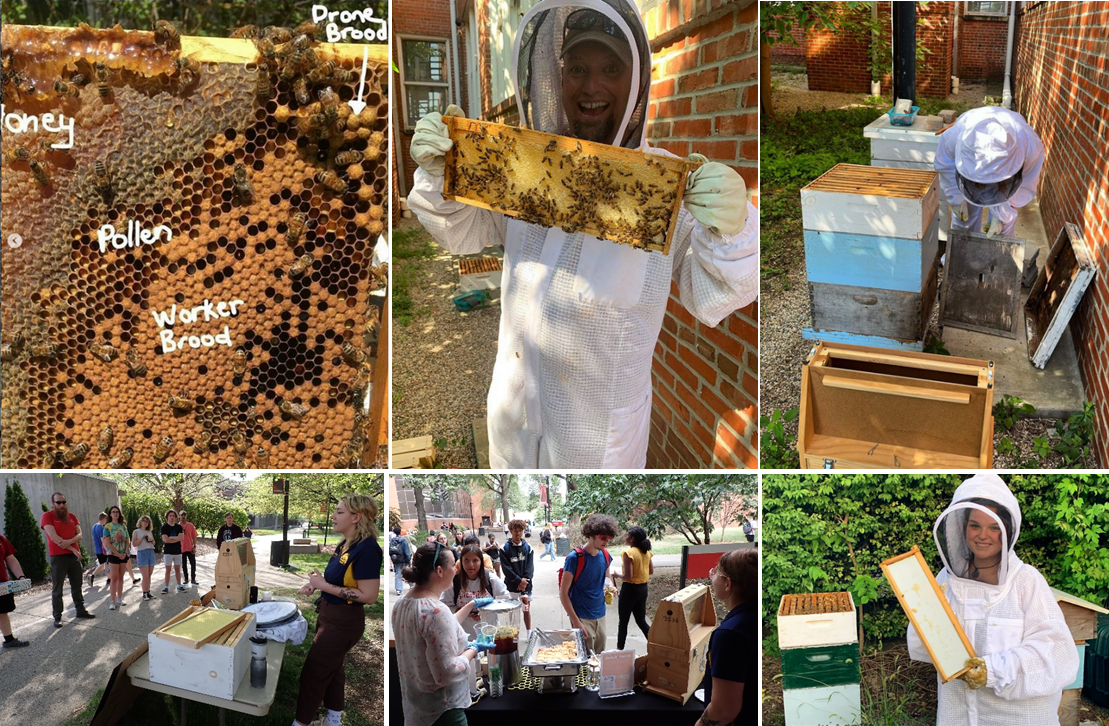
Mushroom Growing
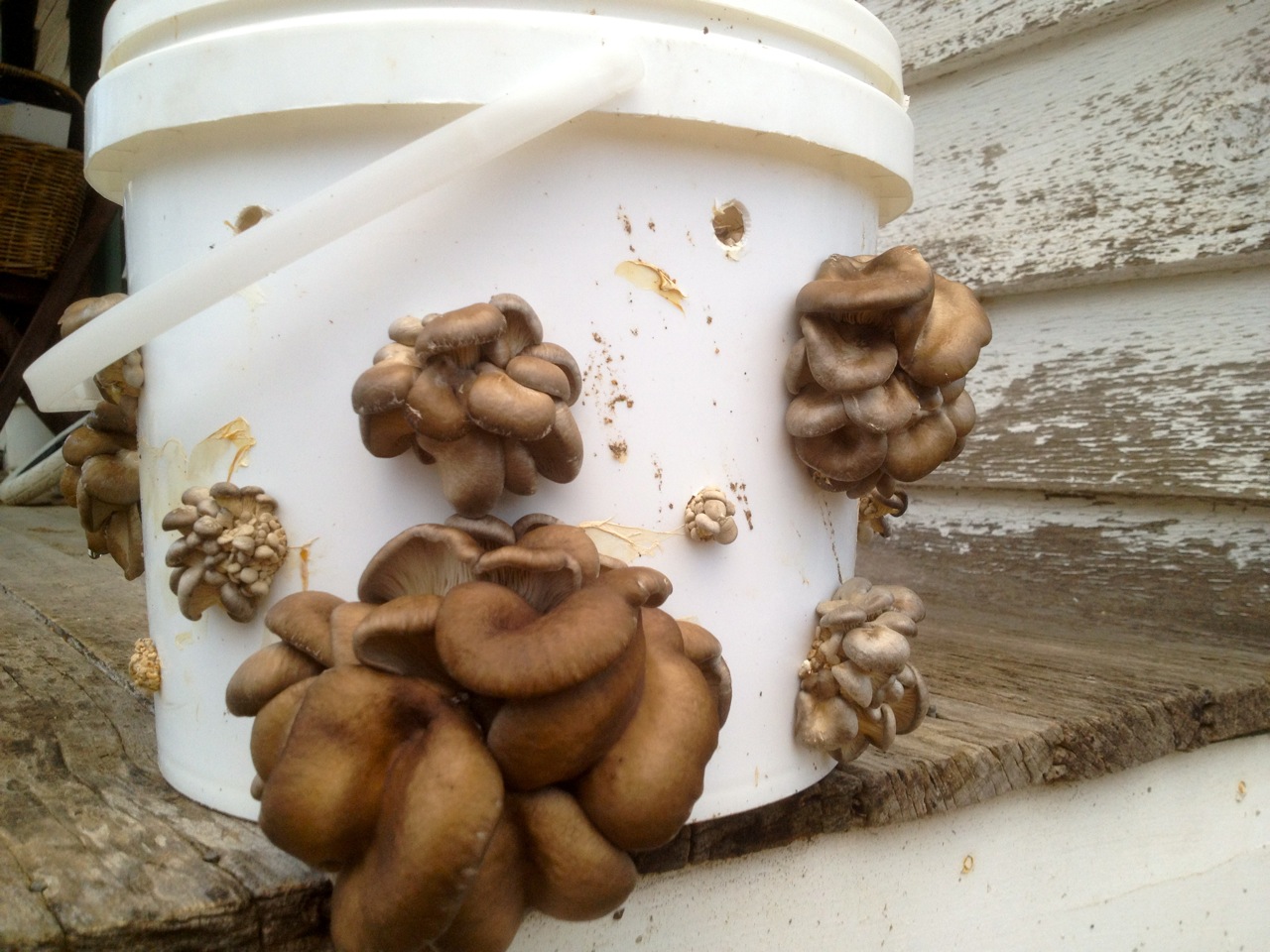 In 2022-23, a student with an incredible passion for mycology and mushroom-growing, Leo Mellen, began experimenting with mushroom cultivation on campus. He established a mushroom-growing tent at first in the worm room at the UofL Community Composting Project, but in November 2023, the indoor mushroom farm was relocated to the basement of Urban & Public Affairs (426 W. Bloom St., west of Bettie Johnson Hall), to compliment the other sustainable urban agriculture projects at at the UPA Horticulture Zone.
In 2022-23, a student with an incredible passion for mycology and mushroom-growing, Leo Mellen, began experimenting with mushroom cultivation on campus. He established a mushroom-growing tent at first in the worm room at the UofL Community Composting Project, but in November 2023, the indoor mushroom farm was relocated to the basement of Urban & Public Affairs (426 W. Bloom St., west of Bettie Johnson Hall), to compliment the other sustainable urban agriculture projects at at the UPA Horticulture Zone.
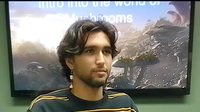 During UofL Sustainability Week, on October 20, 2023, Leo facilitiated an EcoReps Lunch & Learn Workshop on Mushrooms for people who are interested in learning more about the bizarre and magical world of mycology. The workshop explored the ecology and life cycle of fungi; how to cultivate mushrooms; medicinal uses of mushrooms; and research being done with mushrooms. Watch recording.
During UofL Sustainability Week, on October 20, 2023, Leo facilitiated an EcoReps Lunch & Learn Workshop on Mushrooms for people who are interested in learning more about the bizarre and magical world of mycology. The workshop explored the ecology and life cycle of fungi; how to cultivate mushrooms; medicinal uses of mushrooms; and research being done with mushrooms. Watch recording.
Early Learning Campus Gardens
Preschool children at UofL's Early Learning Campus on W. Bloom Street learn about gardening from seed to harvest. 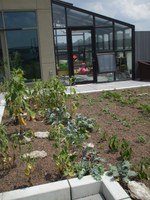 The facility has featured a roof garden and greenhouse with vegetable beds since its opening. Once the UPA Horticulture Zone was created across the street in 2013, the children were taken on regular field trips to help plant seeds and taste the harvest. In spring 2016, UofL's lacrosse team helped install additional raised beds around the street-level outdoor play area so that kids can watch things grow as they play each day.
The facility has featured a roof garden and greenhouse with vegetable beds since its opening. Once the UPA Horticulture Zone was created across the street in 2013, the children were taken on regular field trips to help plant seeds and taste the harvest. In spring 2016, UofL's lacrosse team helped install additional raised beds around the street-level outdoor play area so that kids can watch things grow as they play each day.
The Early Learning Campus is part of the Gladys and Lewis "Sonny" Bass Louisville Scholar House Campus and is an exemplary early child development center for children of UofL faculty, staff and students, and residents of the Louisville Scholar House. The facility is accredited by the National Association for the Education of Young Children (NAEYC) and offers full day curriculum for children aged six weeks to four years.
Garden at The Province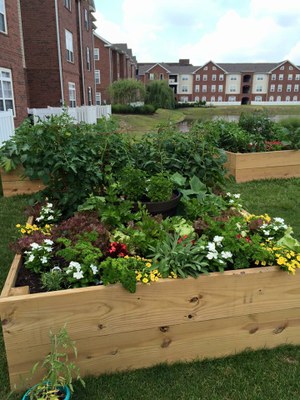
In Spring 2015, a new raised-bed community garden was installed by the Clubhouse at The Province, a UofL Affiliated Housing property on the northwest corner of campus. In summer 2015, a compost bin and rain barrel was added. The new garden features vegetables, herbs, and flowers and is intended for use by residents of The Province, who are welcome to pick fresh produce whenever they wish. All are welcome to regular workshops and tastings throughout the growing season. Stay in touch with events and developments in the garden via The Province's Facebook Page.
Health Sciences Center Garden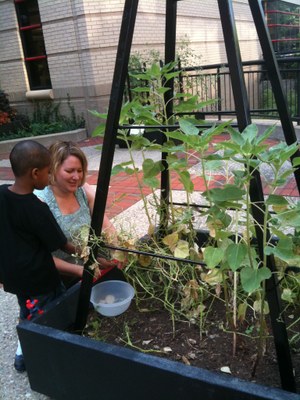
In the spring of 2011, dedicated nutritionists from the Weisskopf Child Evaluation Center (in the Kosair Charities Building at Floyd and Chestnut) decided to create a garden to benefit children receiving evaluation and therapy through the Feeding Disorders Program. The vision was that a garden would provide great opportunities for the children who are very restrictive in the variety of foods they will eat. By May 2011, the Feeding Therapy gardens were growing with tomatoes, sweet potatoes, and green beans sprouting from 3 square raised beds that were already in place between Baxter I and II. To learn more, contact Diana Pantalos.
Shelby Campus Gardens
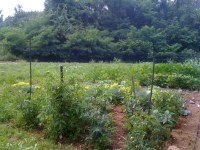
In 2011, dedicated staff at UofL's LEED Gold certified Center for Predictive Medicine on the Shelby campus planted a "Birthday" Garden to provide fresh produce to take the place of cake and ice cream celebrations for employees. Staff and researchers at the Regional Biocontainment Laboratory enjoy a bountiful harvest and have replanted each year. The abundance of produce has prompted staff to host fun related events such as chili cook-offs and pesto parties. The garden has expanded over the years and now includes a compost bin, raised beds made from repurposed pallets, and a vertical herb garden. To learn more, contact Marlene Steffen.
Hydroponics
Louie's Greenhouse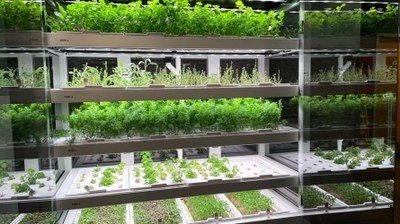
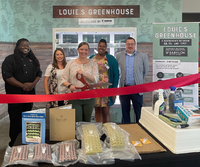 In Fall 2022, UofL Dining installed a hydroponic microfarm inside the Ville Grill in which over 40 different types of microgreens, herbs, lettuces and more are grown and harvested before your eyes for inclusion in tomorrow's menu! Funding to purchase the greenhouse was provided by Canon and the microfarming work is done by UofL Sustainable Dining interns and UofL Dining staff.
In Fall 2022, UofL Dining installed a hydroponic microfarm inside the Ville Grill in which over 40 different types of microgreens, herbs, lettuces and more are grown and harvested before your eyes for inclusion in tomorrow's menu! Funding to purchase the greenhouse was provided by Canon and the microfarming work is done by UofL Sustainable Dining interns and UofL Dining staff. Bringing the greens: Ville Grill features new microfarm (UofL News, Oct. 12, 2022)
Bringing the greens: Ville Grill features new microfarm (UofL News, Oct. 12, 2022)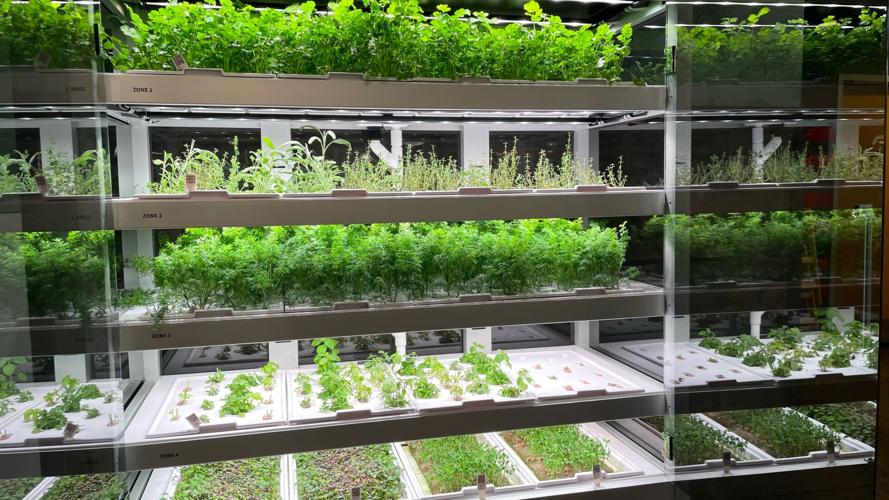 UofL Dining expands its menu using a new tool bringing fresh food to campus (WDRB, Nov. 17, 2022)
UofL Dining expands its menu using a new tool bringing fresh food to campus (WDRB, Nov. 17, 2022)
KPPC brings gardening into the office
In 2018, the Kentucky Pollution Prevention Center (KPPC) at UofL's Shelby Campus experimented with hydroponic gardening inside their office. KPPC has been an Advocate Member of the KY EXCEL program since its inaugural year in 2006. KY EXCEL is a free, voluntary program that encourages members to complete projects that improve the environment at home, within an organization, or in a community. There are various levels of tiered membership for participants that include for non-regulatory members – Farm and Advocate, and regulated members – Partner, Leader and Master. Visit the KY EXCEL website to find out more about being a voluntary member. In keeping with KPPC’s ongoing KY EXCEL Advocate membership, a sustainability project is identified annually that can improve the Center’s day-to-day operations and serve as a demonstration of the different ways to consider sustainable practices in the workplace for our clients.
KPPC selected hydroponic gardening for their 2018 sustainability project. A hydroponic garden is a low-maintenance, cost-effect ive way to encourage and demonstrate a commitment to environmental and social sustainability. Alex Beebe, a Speed School engineering co-op at KPPC, was assigned as the project lead for researching, designing, procuring, constructing and maintaining the hydroponic garden for the office space. “As a student co-op, it was an exciting opportunity to lead our 2018 Kentucky EXCEL project.” he said.
ive way to encourage and demonstrate a commitment to environmental and social sustainability. Alex Beebe, a Speed School engineering co-op at KPPC, was assigned as the project lead for researching, designing, procuring, constructing and maintaining the hydroponic garden for the office space. “As a student co-op, it was an exciting opportunity to lead our 2018 Kentucky EXCEL project.” he said.
A deep water culture hydroponic system was selected. This was comprised of containers for the nutrient rich water, aeration equipment, a LED grow light, net pots and clay pebbles. KPPC staff donated some of the materials. The total cost of a four-container setup was around $200. A selection of herbs were grown from seed in soil and then transferred to the hydro system as mature plants where they thrived, yielding multiple harvests of mint, basil, oregano, and chives. Maintenance involved checking PH and nutrient levels on an every other week schedule that only required about ten minutes each time. Additionally, the herbs were harvested around the same time to prevent overgrowth and provide KPPC employees with a regular supply to use at home or share with others.
One of the project work objectives was to establish an online resource to assist others with bringing the benefits of this sustainability initiative into an office, classroom, home or any other appropriate indoor setting.
 A hydroponic gardening web page has been created and is now available on the KPPC website. There is a frequently asked question (FAQ) styled layout of information about the project along with a promotional video, a slide presentation that can be used to share the story with others, along with additional resources including a Hydroponic Gardening Maintenance Guide.
A hydroponic gardening web page has been created and is now available on the KPPC website. There is a frequently asked question (FAQ) styled layout of information about the project along with a promotional video, a slide presentation that can be used to share the story with others, along with additional resources including a Hydroponic Gardening Maintenance Guide.
“Initially, the project was to create a hydroponic garden for our own use within the office. As planning and construction occurred, we realized that this could serve as an example of an affordable, unique and time-conscious sustainability project for any workplace” said Alex Beebe. “Leading the hydroponic project gave me experience that engineering co-ops rarely receive such as video production, web page writing, graphic design and more. KPPC encourages utilizing creative projects to involve employees in a sustainable culture.”
Find out more about hydroponic gardening and the benefits it can bring to the workplace.
UofL Green Scene columns:
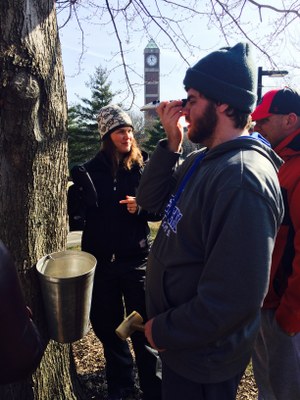
UofL students tap maple trees for syrup (Courier-Journal, 3/11/16)
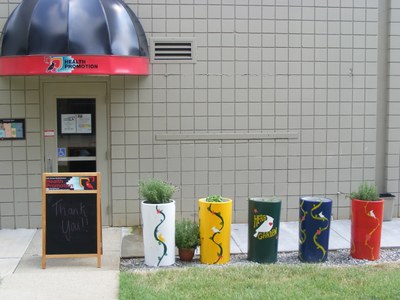
July 2011 - UofL's Office of Health Promotion was inspired to start an herb garden in repurposed cigarette butt containers!
Resources for Urban Agriculture
TheFood In Neighborhoods (FIN) Community Coalition provides a wealth of resources, including those compiled by the Urban Agriculture Coalition (find gardens, calendar, directory, discussion forum, and resources for growers). Follow on

Louisville Grows - a non-profit whose mission is to grow a just and sustainable community in Louisville through urban agriculture, urban forestry, and environmental education. An excellent source for local knowledge, seeds, and starts. Check out their handy Louisville Planting Calendar. Follow on

Sustainable Agriculture of Louisville - seeking to educate, train, empower and accompany the next generation of farmers for the rebuilding of a just and local food economy in Louisville and its regional foodshed.
FallingFruit.org is a worldwide mapping resource for urban foragers. Check out ComPassion Fruit Louisville's map of local, public resources that you can harvest from!
Hydroponic Gardening - The Kentucky Pollution Prevention Center (KPPC) at UofL's Shelby Campus has experimented with hydroponic gardening inside their office and assembled lots of resources online.
-
15Thousand Farmers - helping create, empower, and inspire 15,000 new, sustainable, neighborhood backyard/front yard farmers in Louisville to feed themselves, their families and others! Follow on


